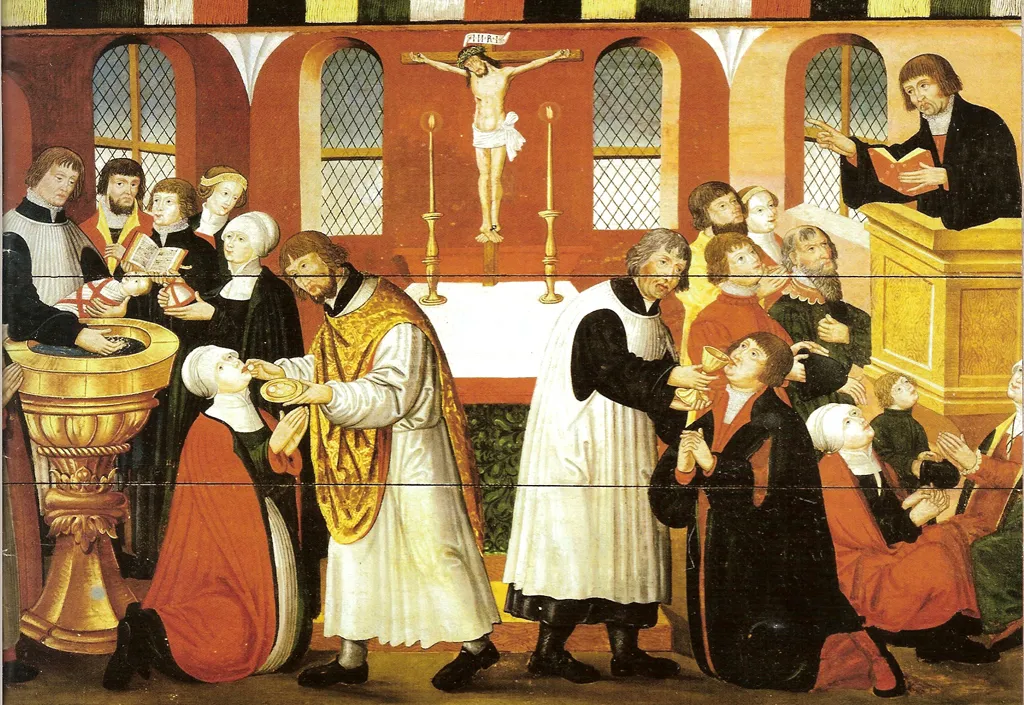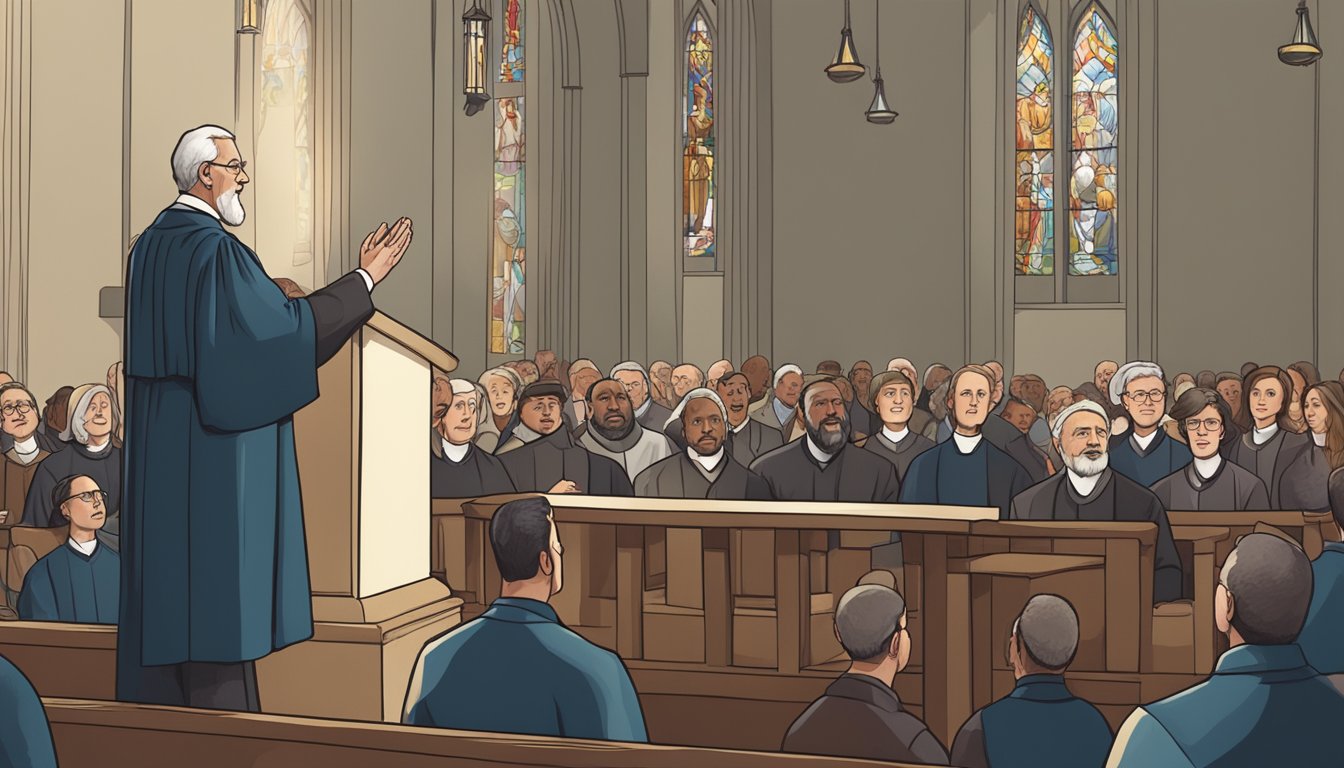Protestantism is a branch of Christianity that emerged in the 16th century as a result of the Protestant Reformation. It is a diverse movement with numerous denominations, each with its own unique beliefs and practices. Many people wonder whether being a Protestant means being a Christian, and the answer is yes. Protestants are Christians who believe in Jesus Christ as their Lord and Savior.

While Protestants and Catholics share many core beliefs, there are significant differences in their practices and interpretations of scripture. Protestants believe in the authority of scripture and reject the idea of papal infallibility. They also reject certain Catholic sacraments, such as confession and the Eucharist, and place a greater emphasis on individual faith and salvation. With so many different denominations and interpretations of scripture within Protestantism, it can be difficult to understand the movement as a whole.
Key Takeaways
- Protestantism is a branch of Christianity that emerged in the 16th century.
- Protestants are Christians who believe in Jesus Christ as their Lord and Savior.
- While Protestants and Catholics share many core beliefs, there are significant differences in their practices and interpretations of scripture.
Understanding Protestantism
https://www.youtube.com/watch?v=a6Qvzo5ix6o&embed=true

Protestantism is a branch of Christianity that originated in the 16th century as a result of the Protestant Reformation. This movement was led by figures such as Martin Luther, John Calvin, and Huldrych Zwingli, who challenged the authority of the Roman Catholic Church and sought to reform it.
Historical Roots
The Protestant Reformation began in the early 1500s when Martin Luther, a German monk, challenged the Catholic Church’s practice of selling indulgences. Luther believed that salvation could be achieved through faith alone, rather than through good works or paying for indulgences. He also believed that the Bible should be available in the vernacular, so that common people could read and understand it.
Luther’s ideas quickly gained popularity, and other reformers such as John Calvin and Huldrych Zwingli emerged in other parts of Europe. These reformers challenged other aspects of Catholic doctrine, such as the authority of the pope and the role of priests.
Core Beliefs
Protestantism is characterized by several core beliefs, including the belief in justification by faith alone, the priesthood of all believers, and the authority of the Bible. Protestants believe that salvation can only be achieved through faith in Jesus Christ, and that good works are a result of this faith rather than a means of achieving it.
Protestants also believe that all believers have direct access to God and do not need a priest or other intermediary to communicate with Him. They believe that the Bible is the sole authority for Christian doctrine and that it should be interpreted literally.
Key Figures
Several key figures played a role in the development of Protestantism. Martin Luther is perhaps the most well-known, but John Calvin and Huldrych Zwingli also made significant contributions. Calvin, for example, developed the idea of predestination, which holds that God has already chosen who will be saved and who will be damned.
Overall, Protestantism has had a significant impact on Christianity and the world as a whole. Its emphasis on individual faith and the authority of the Bible has influenced many other Christian denominations and has played a role in shaping Western culture.
Protestants and Christianity
https://www.youtube.com/watch?v=5JmFTAFXt9w&embed=true
Protestant Christianity Defined
Protestantism is a branch of Christianity that originated in the 16th century as a movement to reform the Catholic Church. Protestants believe in the same basic tenets of Christianity as Catholics, such as the belief in one God, the Trinity, and the resurrection of Jesus Christ. However, they differ in their interpretation of certain doctrines and practices.
Protestant vs Catholic Christianity
While both Catholics and Protestants are Christians, there are some significant differences between the two. One of the main differences is the role of the Pope. Catholics believe that the Pope is the head of the Church and has the authority to interpret scripture and make decisions on matters of faith and morals. Protestants, on the other hand, reject the authority of the Pope and believe in the priesthood of all believers.

Another difference is the doctrine of salvation. Catholics believe in the concept of “works-based salvation,” which means that salvation is earned through good works and adherence to the sacraments. Protestants, on the other hand, believe in “faith-based salvation,” which means that salvation is achieved through faith alone.
Despite these differences, both Catholics and Protestants share a common faith in Jesus Christ and his teachings. They both believe in the importance of prayer, worship, and the study of scripture. Ultimately, their shared goal is to live a life that is pleasing to God and to spread the message of Christ’s love and salvation to others.
Variants of Protestantism
https://www.youtube.com/watch?v=F6ZsIyKHTNI&embed=true
Protestantism is a branch of Christianity that emerged in the 16th century as a response to perceived errors, abuses, and discrepancies in the Catholic Church. Today, Protestantism is a diverse movement with many different denominations, each with its own unique beliefs and practices.
Denominational Diversity
Protestantism is characterized by its denominational diversity. Some of the most well-known Protestant denominations include Lutheran, Anglican, Baptist, Methodist, and Presbyterian. Each of these denominations has its own unique history, beliefs, and practices.
For example, Lutherans trace their roots back to the teachings of Martin Luther, a German monk who played a key role in the Protestant Reformation. Lutherans believe in the doctrine of justification by faith alone and practice two sacraments: baptism and the Lord’s Supper.
« Is Hallelujah a Christian Song? Exploring the Song’s Religious Roots
Is ‘The Sound of Freedom’ a Christian Movie? Exploring the Movie’s Themes and Messages »
Anglicans, on the other hand, trace their roots back to the Church of England. Anglicans believe in the authority of Scripture, the importance of tradition, and the sacraments of baptism and the Eucharist.
Baptists are known for their emphasis on individual freedom and the separation of church and state. They believe in the authority of Scripture, the importance of personal faith, and the practice of baptism by immersion.
Methodists were founded by John Wesley, an English clergyman who sought to reform the Church of England. Methodists believe in the importance of personal faith, the authority of Scripture, and the practice of baptism and the Lord’s Supper.
Presbyterians trace their roots back to Scotland and the teachings of John Knox. They believe in the sovereignty of God, the authority of Scripture, and the importance of the sacraments of baptism and the Lord’s Supper.
Evangelicals and Mainline Protestants

Protestantism can also be divided into two broad categories: evangelicals and mainline Protestants. Evangelicals are known for their emphasis on personal conversion and evangelism. They believe in the authority of Scripture, the importance of personal faith, and the practice of baptism and the Lord’s Supper.
Mainline Protestants, on the other hand, are known for their more liberal social and theological views. They tend to place less emphasis on personal conversion and evangelism and more emphasis on social justice and the role of the church in society. Mainline Protestants include denominations such as the United Methodist Church, the Evangelical Lutheran Church in America, and the Presbyterian Church (USA).
In conclusion, Protestantism is a diverse movement with many different denominations and beliefs. Understanding the denominational diversity within Protestantism is important for anyone seeking to understand this branch of Christianity.
The Authority of Scripture
https://www.youtube.com/watch?v=yRxfibqfkX4&embed=true
The authority of Scripture is a central belief for Protestants, and it is one of the key factors that distinguish them from other Christian denominations. Two important aspects of the authority of Scripture for Protestants are Sola Scriptura and the interpretation of the Bible.
Sola Scriptura

Sola Scriptura is a Latin term that means “Scripture alone.” This principle refers to the belief that the Bible is the only source of authority for Christian doctrine and practice. According to this principle, the Bible is the only infallible and inerrant guide for faith and life. This means that any other sources of authority, such as church tradition or the teachings of the church, are subordinate to the Bible.
Protestants believe that the Bible is the inspired Word of God and that it contains everything necessary for salvation and Christian living. They also believe that the Bible is clear and understandable to anyone who reads it. Therefore, they reject the idea that only a select group of people, such as the clergy, can interpret the Bible.
Interpretation of the Bible
Interpretation of the Bible is another important aspect of the authority of Scripture for Protestants. They believe that the Bible is the only infallible guide for faith and life, but they also recognize that different people can interpret the Bible in different ways. Therefore, they emphasize the importance of studying the Bible carefully and using sound principles of interpretation.
Protestants believe that the Bible should be interpreted in light of its historical and cultural context. They also believe that the Bible should be interpreted in light of other passages of Scripture, rather than in isolation. They reject the idea that any particular person or group has the authority to interpret the Bible infallibly.
In summary, the authority of Scripture is a central belief for Protestants, and it is based on the principles of Sola Scriptura and the careful interpretation of the Bible. Protestants believe that the Bible is the only infallible guide for faith and life, and they reject the idea that any other sources of authority, such as church tradition or the teachings of the church, are equal to or greater than the Bible.
Sacraments and Rituals

https://www.youtube.com/watch?v=CU7bEZAmr1I&embed=true
Protestantism is a branch of Christianity that emphasizes the importance of personal faith in Jesus Christ. While there are many different denominations within Protestantism, they generally share a belief in the authority of the Bible and the priesthood of all believers.
Baptism
Baptism is a sacrament that is recognized by most Protestant denominations. It is a ritual that symbolizes the washing away of sin and the beginning of a new life in Christ. Different denominations have different beliefs about baptism, but most agree that it is an important step in a believer’s journey of faith.
For example, Baptists believe that baptism should be reserved for those who have made a personal confession of faith in Jesus Christ. They practice baptism by immersion, which means that the person being baptized is fully immersed in water. Other denominations, such as Methodists and Presbyterians, practice baptism by sprinkling or pouring water over the head.
Communion
Communion, also known as the Lord’s Supper or the Eucharist, is another sacrament that is recognized by most Protestant denominations. It is a ritual that commemorates the Last Supper of Jesus Christ with his disciples. During the ritual, believers eat bread and drink wine (or grape juice) to symbolize the body and blood of Christ.

Different denominations have different beliefs about communion. For example, Catholics believe in transubstantiation, which means that the bread and wine actually become the body and blood of Christ. Protestants, on the other hand, generally believe in consubstantiation or symbolic presence, which means that the bread and wine represent the body and blood of Christ.
In conclusion, sacraments and rituals are an important part of Protestantism. Baptism and communion are two of the most widely recognized sacraments, and they hold great significance for believers. While different denominations may have different beliefs about these rituals, they all share a common commitment to personal faith in Jesus Christ.
The Role of Clergy
Pastoral Leadership
In Protestantism, the clergy plays an important role in providing pastoral leadership to the congregation. The clergy is responsible for preaching and teaching the Word of God, leading worship services, and providing spiritual guidance to the members of the church. They are also responsible for providing counseling and support to those in need.
Protestant pastors are often seen as community leaders who are involved in local outreach programs, social justice initiatives, and other community events. They are also responsible for overseeing the administration of the church, including managing its finances and facilities.
Ordination Practices

Protestant clergy are ordained through a process that varies depending on the denomination. In general, ordination is a formal recognition of a person’s call to ministry and their qualifications for pastoral leadership.
The ordination process typically involves a period of theological education and training, followed by an examination of the candidate’s theological knowledge and practical ministry skills. Once ordained, the clergy is authorized to perform sacraments such as baptism and communion, and to officiate at weddings and funerals.
In some Protestant denominations, such as the Anglican Church, the clergy is organized into a hierarchical structure that includes bishops, priests, and deacons. Bishops are responsible for overseeing the work of the priests and deacons in their diocese, while priests are responsible for leading individual congregations. Deacons are responsible for assisting the clergy and serving the needs of the community.
Overall, the role of clergy in Protestantism is to provide spiritual leadership and guidance to the congregation, and to serve as a representative of the church in the community.
Worship and Practices
https://www.youtube.com/watch?v=Ofc7VWH908Y&embed=true
Sunday Service

Protestant Christians typically attend Sunday services, which are usually held in churches. The services typically include singing hymns, praying, and listening to a sermon. The sermon is usually based on a reading from the Bible and is intended to provide guidance and inspiration to the congregation.
Protestant churches vary in their style of worship, with some being more traditional and formal, while others are more contemporary and informal. Some churches use liturgy, or a pre-set order of worship, while others have a more spontaneous style of worship.
Religious Holidays
Protestant Christians celebrate a number of religious holidays throughout the year. The most important of these is Easter, which commemorates the resurrection of Jesus Christ. Many churches hold special services on Easter Sunday, which may include music, drama, and other special events.
Other important holidays include Christmas, which celebrates the birth of Jesus Christ, and Pentecost, which commemorates the coming of the Holy Spirit. In addition to these major holidays, many Protestant churches also celebrate other religious holidays throughout the year.
Overall, worship and tradition are central to the practice of Protestant Christianity. The gospel message is seen as the foundation of the faith, and piety is encouraged as a way of deepening one’s relationship with God.
Protestantism in Society

Social Impact
Protestantism has had a significant impact on society, particularly in the areas of social welfare and education. Many Protestant churches have established charitable organizations and missions to serve those in need, both domestically and internationally. These organizations provide services such as food and shelter for the homeless, disaster relief, and medical care for the sick.
Protestantism has also played a role in the development of education. Many universities and colleges, including some of the most prestigious in the world, were founded by Protestant denominations. These institutions have had a profound impact on society, producing leaders in various fields, including science, politics, and business.
Political Involvement
Protestantism has played a significant role in politics, both historically and in modern times. In many countries, Protestantism has been closely tied to the national church, and Protestant leaders have often held positions of power within the government.
In addition to its involvement in national politics, Protestantism has also been involved in social and economic issues. Protestant denominations have been vocal advocates for issues such as civil rights, workers’ rights, and environmental protection.

Overall, Protestantism has had a significant impact on society, both in terms of social welfare and political involvement. Its influence can be seen in many areas of life, including education, economics, and politics.
Global Protestant Demographics
https://www.youtube.com/watch?v=tb1CQBfHvJM&embed=true
Population Distribution
Protestantism is a branch of Christianity that originated in the 16th century Reformation. Today, it is one of the largest and most diverse religious groups in the world. According to Wikipedia, there are between 800 million and 1 billion Protestants worldwide. This makes up roughly 37% of the Christian population globally.
The United States has the largest Protestant population in the world, with over 240 million adherents. This is followed by Brazil, which has approximately 65 million Protestants. In England, the Anglican Church is the largest Protestant denomination, with over 25 million members. In Germany, the Lutheran Church is the largest Protestant denomination, with over 21 million members.
Growth and Decline
While Protestantism has grown significantly in some parts of the world, it has declined in others. According to a Pew Research Center report, the Protestant population in Europe has declined by 5% between 1910 and 2010. In contrast, the Protestant population in Africa has grown by over 500% during the same period.
In the United States, the Protestant population has also declined in recent years, with many Americans identifying as “nones” or having no religious affiliation. However, Protestantism still remains the largest religious group in the country, with over 70% of Americans identifying as Protestant or Evangelical.
Overall, the growth and decline of Protestantism varies greatly depending on the region and country. While some countries have seen significant growth, others have experienced decline. Nonetheless, Protestantism remains a significant religious group globally, with a diverse and widespread population.
Ecumenical Movements
https://www.youtube.com/watch?v=wfN4YE_4Rpo&embed=true
Ecumenism is a movement that seeks to promote unity among different Christian denominations. It emphasizes the universality of the Christian faith and unity among churches. The movement seeks to recover the apostolic sense of unity in diversity.
Interdenominational Relations
The ecumenical movement encourages interdenominational relations between different Christian churches. This includes dialogue, cooperation, and joint worship services. The goal is to promote understanding and respect between different Christian traditions.
Dialogue with Other Faiths
The ecumenical movement also encourages dialogue with other faiths. This includes dialogue with members of non-Christian religions. The goal is to promote understanding and respect between different religious traditions.
Overall, the ecumenical movement seeks to promote unity and diversity within the Christian faith. It recognizes that there are many different Christian traditions and denominations, but emphasizes the common ground that they share. The movement also recognizes the importance of dialogue and cooperation with members of other faiths. By working together, Christians can promote peace and understanding in the world.
Challenges and Controversies
https://www.youtube.com/watch?v=DOoUDpqtq-k&embed=true
Internal Debates
The question of whether a Protestant is a Christian has been a topic of internal debate within the Protestant community. Some Protestants argue that they represent the true form of Christianity and that other denominations have strayed from the original teachings of Jesus Christ. This has led to dissent and division within the Protestant community, with some groups labeling themselves as fundamentalist and others as liberal.
One of the main points of contention is the issue of identity. Some Protestants believe that being a Christian means adhering to a strict set of beliefs and practices, while others believe that Christianity is a more open and inclusive faith that welcomes people from all walks of life. This has led to debates over issues such as same-sex marriage, abortion, and women’s rights.
External Criticisms
Protestantism has also faced external criticisms from other religious groups and secular organizations. Some critics argue that Protestantism is too focused on individualism and personal salvation, and that it neglects issues of social justice and community involvement. Others criticize Protestantism for being too conservative or too liberal, depending on their own political and social views.
One of the main criticisms of Protestantism is that it has become too closely associated with conservative politics in the United States. Some critics argue that this has led to a narrow and exclusionary view of Christianity that is out of step with the broader social and cultural trends in the country. Others argue that Protestantism has become too liberal and has lost its traditional values and beliefs.
In conclusion, the question of whether a Protestant is a Christian is a complex and controversial issue that has been the subject of much debate and discussion within the Protestant community and beyond. While there are many different views and perspectives on this question, it is clear that Protestantism will continue to be an important and influential force in the world of religion and spirituality for many years to come.
Frequently Asked Questions
https://www.youtube.com/watch?v=XZnyYSfJ3_E&embed=true
What distinguishes Protestant beliefs from other Christian denominations?
Protestantism is a branch of Christianity that emerged during the Reformation in the 16th century. Protestants believe in the authority of the Bible as the sole source of religious truth and reject the authority of the Pope. They also reject certain Catholic practices, such as the veneration of saints and the use of indulgences. Protestantism encompasses a wide range of beliefs, including Lutheranism, Calvinism, Anglicanism, and Methodism.
Can you explain the Protestant Reformation and its significance in Christian history?
The Protestant Reformation was a religious movement that began in the 16th century in Europe. It was led by figures such as Martin Luther and John Calvin, who sought to reform the Catholic Church. The Reformation led to the establishment of Protestantism as a separate branch of Christianity, and it had a profound impact on European history. It led to religious wars, the establishment of new churches, and the spread of religious freedom.
How do the Catholic and Protestant Bibles differ?
The Catholic and Protestant Bibles differ in the number of books they contain. The Catholic Bible includes several books that are not found in the Protestant Bible, such as Tobit, Judith, and Maccabees. These books are known as the Apocrypha. Catholics believe that these books are divinely inspired, while Protestants do not. Additionally, the Catholic and Protestant Bibles differ in their translations and interpretations of certain passages.
In what ways do Protestant denominations vary from each other?
Protestant denominations vary from each other in their beliefs and practices. For example, Lutherans believe in salvation by faith alone, while Anglicans place a greater emphasis on good works. Baptists practice adult baptism, while Methodists practice infant baptism. Pentecostals believe in the gifts of the Holy Spirit, such as speaking in tongues, while Calvinists do not. Despite these differences, Protestants share a common belief in the authority of the Bible and the importance of faith in Jesus Christ.
What is the role of Mary in Protestant Christianity?
Protestants generally do not venerate Mary to the same extent as Catholics. While Catholics believe that Mary was sinless and played a role in the salvation of humanity, Protestants view her as a faithful servant of God who gave birth to Jesus Christ. Some Protestant denominations, such as Anglicans and Lutherans, do celebrate certain events in Mary’s life, such as her Assumption or Visitation.
What are the key differences between Protestant, Pentecostal, and Born-Again Christians?
Protestantism is a broad term that encompasses many different denominations, including Pentecostals and Born-Again Christians. Pentecostals place a greater emphasis on the gifts of the Holy Spirit, such as speaking in tongues and prophecy. Born-Again Christians believe in a personal relationship with Jesus Christ and the need for spiritual rebirth. Despite these differences, all three groups share a common belief in the authority of the Bible and the importance of faith in Jesus Christ.













